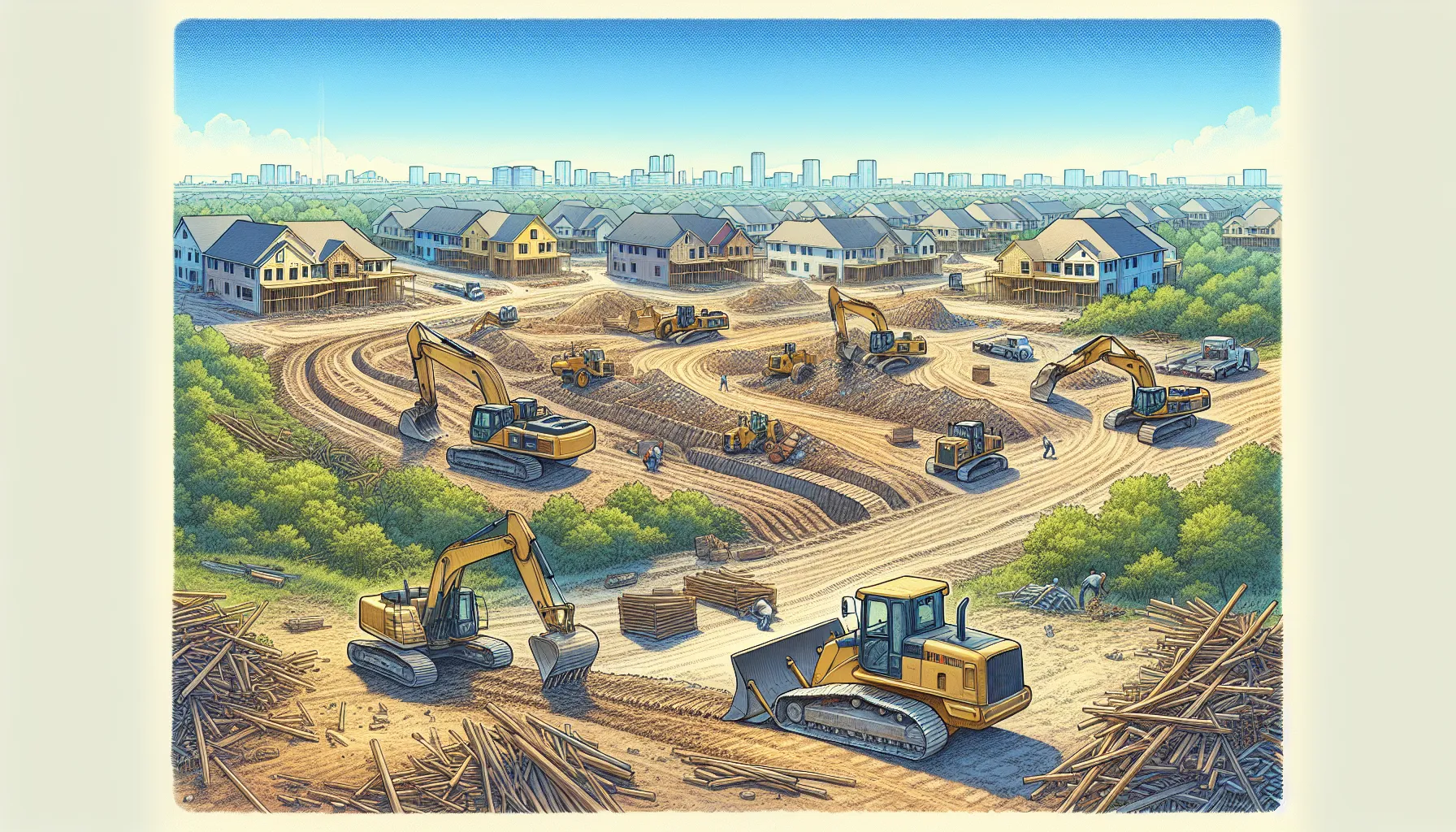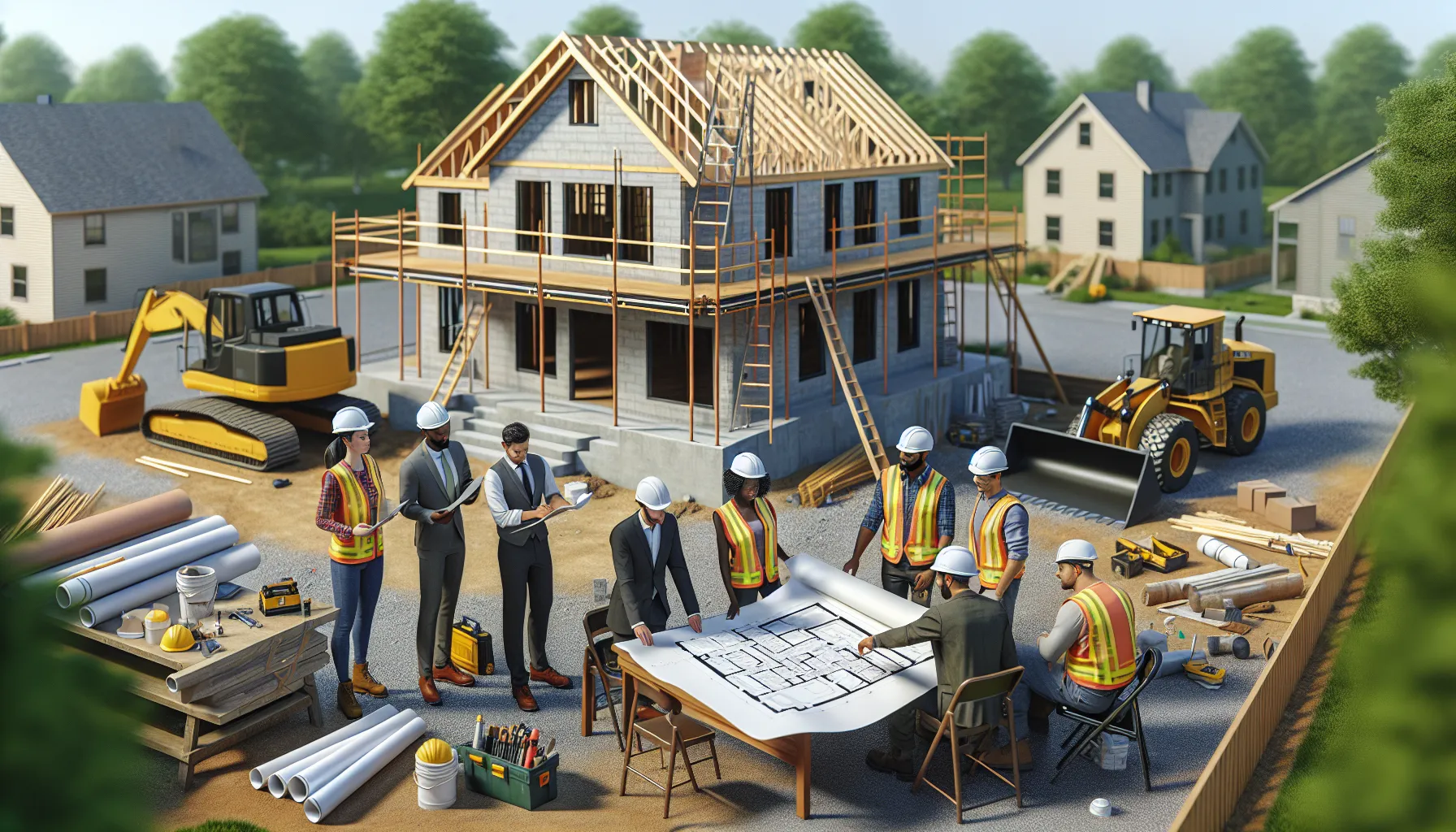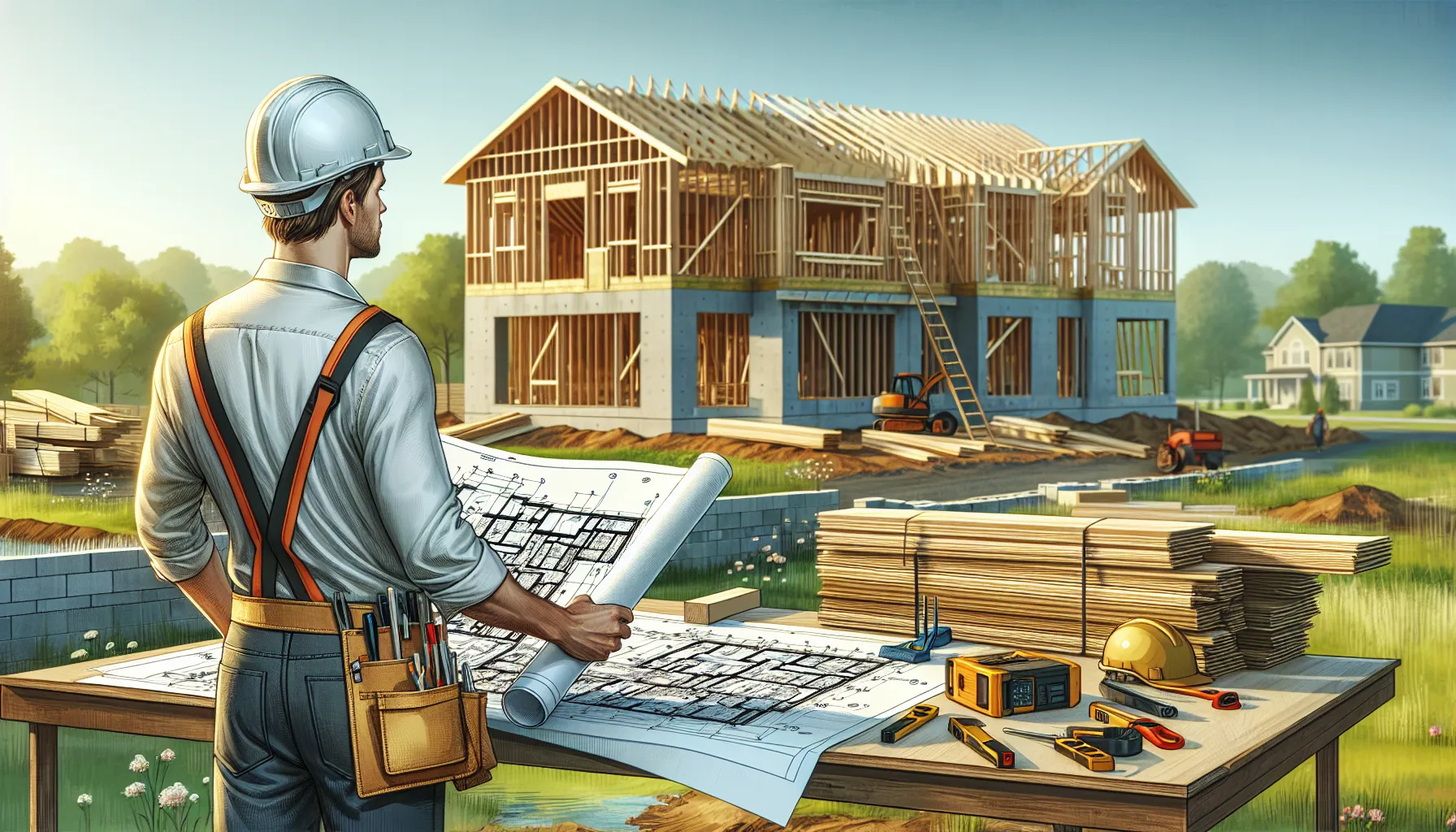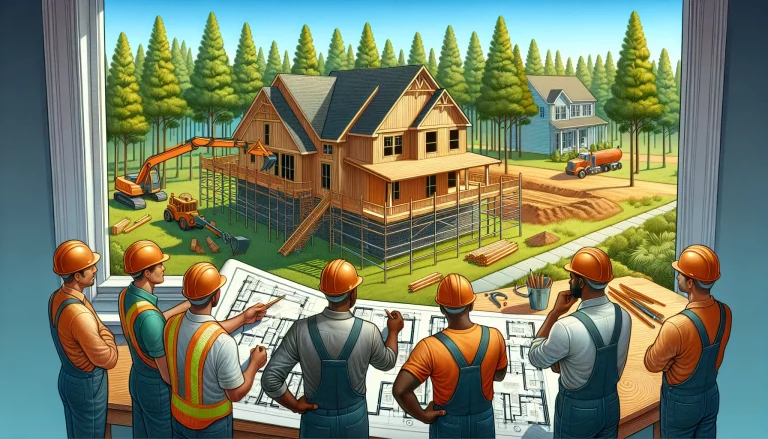Key Takeaways
- Budget Understanding: The average cost to build a home in the U.S. varies greatly, typically ranging from $100 to $200 per square foot, influenced by location and design choices.
- Permits and Fees: Construction permits and fees should not be overlooked, as they can range from $1,500 to $10,000, depending on local regulations.
- Labor Costs: Hiring a general contractor can add 10% to 20% to overall expenses. Skilled labor rates can vary from $50 to $150 per hour for subcontractors, representing a significant cost in the building process.
- Material Expenses: Materials can account for 40% to 60% of total building costs; evaluating material options beforehand helps prevent budget overruns.
- Additional Financial Factors: Utilities and landscaping can add anywhere from $6,500 to $20,000 to the overall costs. It’s crucial to budget for these additional expenses to avoid financial strain.
- Emergency Budgeting: Setting aside an emergency fund, typically 10% to 20% of the total budget, is vital for accommodating unexpected costs during the construction phase.
Building a house is an exciting journey, but it can also be overwhelming when it comes to understanding the costs involved. From land acquisition to finishing touches, the expenses can add up quickly, leaving many of us wondering just how much we need to budget. Did you know that the average cost to build a home in the U.S. can vary significantly based on location and personal choices?
In this article, we’ll break down the typical expenses associated with building a house, helping us navigate this complex process with confidence. We’ll explore everything from permits and labor to materials and design, ensuring we have a clear picture of what to expect. By the end, we’ll equip ourselves with the knowledge to make informed decisions and avoid common pitfalls, making our dream home a reality without breaking the bank.
Overview of Home Building Costs
Building a house involves multiple costs, often leading to confusion about total expenses. We can expect to encounter a range of expenses, from land acquisition to finishing touches. Location plays a critical role, as labor and material costs can shift dramatically based on geographic areas. According to a recent report from the National Association of Home Builders, the average cost per square foot across the U.S. is between $100 and $200, highly dependent on the chosen market and home design.
Permits and fees are significant upfront costs, often overlooked. These vary by municipality but can total $1,500 to $10,000, including building permits, zoning fees, and impact fees. It’s vital to consult local regulations to understand what fees apply to our specific project. These initial costs can set the foundation for budget accuracy.
Labor costs also contribute heavily to the overall expenses. Contractors typically charge between $50 and $150 per hour, topping the list of expenses during construction. If we decide to hire a general contractor, expect an additional 10% to 20% markup on materials and labor. This management fee covers coordination and project oversight, ensuring quality and compliance.
Materials represent a substantial portion of the budget too, often accounting for 40% to 60% of total costs. Expenses for foundational materials, framing supplies, roofing, and finishes can add up quickly. For instance, quality windows can range from $300 to $1,000 each, depending on style and energy efficiency. Evaluating materials ahead of time can prevent budget overruns.
Finally, we can’t ignore the cost of landscaping and interior design. These elements add aesthetic value but can increase the final price tag significantly. Landscaping costs might vary from $2,000 for basic features to over $20,000 for elaborate designs. Planning these aspects early ensures that every detail aligns with our vision and budget.
Land and Site Preparation

Land and site preparation are critical initial steps in the home-building process, significantly influencing overall costs. Understanding these expenses helps us manage our budget effectively as we embark on building our dream home.
Purchasing Land
Purchasing land represents one of the most substantial investments when building a house. Prices vary widely based on location, zoning regulations, and land characteristics. For example, urban plots often command higher prices compared to rural land. Costs can range from $5,000 to over $1 million, depending on these factors. In addition to purchase costs, we should account for additional expenses, such as property taxes, inspection fees, and surveyor fees. These costs can add another $1,000 to $3,000 to our budget. Conducting due diligence on local regulations and land suitability ensures we make informed decisions before finalizing our purchase.
Site Clearing and Grading
Site clearing and grading are essential processes that prepare the land for construction. Clearing removes trees, rocks, and debris, while grading ensures proper drainage and a stable foundation. These processes generally cost between $1,500 and $5,000 but can increase depending on site conditions. For instance, heavily forested or sloped lands may incur additional expenses. We must also consider permits and inspections, which can cost an additional $500 to $2,000. Engaging a professional landscaper or contractor guarantees compliance with local regulations and promotes effective land preparation, setting the stage for a successful build.
Construction Costs

Construction costs encompass various expenses during the home building journey, directly impacting the overall budget. Understanding these costs helps us plan efficiently and avoid unexpected financial burdens.
Foundation and Framing
Foundation and framing form the backbone of any home. The foundation, crucial for stability, typically costs between $10,000 and $20,000, depending on materials and soil conditions. This expense involves selecting between slab, crawl space, or basement foundations, each with distinct costs and benefits. Framing costs range from $15 to $30 per square foot, influenced by the house size and design complexity. Engaging skilled labor for framing ensures structural integrity, while using quality materials prevents future issues. Addressing these costs up front allows us to allocate resources wisely and sets a strong base for further construction.
Roofing and Exterior Work
Roofing and exterior work significantly influence a home’s appearance and durability. Roofing costs generally range from $5,000 to $15,000, depending on the chosen materials—options like asphalt shingles, metal, or tile each carry specific price tags. We must also consider durability and maintenance when selecting roofing materials, as long-term expenses can vary greatly. Exterior work includes siding, windows, and doors, typically accounting for 15% to 30% of total construction costs. Investing in high-quality materials not only enhances the home’s curb appeal but also contributes to energy efficiency. Proper budgeting for these components keeps the project on track and reduces the risk of costly last-minute changes.
Interior Finishing
Interior finishing transforms a house into a home, affecting both aesthetics and comfort. This stage includes drywall, flooring, cabinetry, and fixtures, with costs ranging from $50 to $150 per square foot. For instance, kitchen cabinets can vary from $3,000 to $30,000 based on materials and design choices. Prioritizing essential areas, such as the kitchen and bathrooms, ensures these spaces are functional and inviting. Lighting and HVAC systems also fall under this category, adding to the expense but significantly enhancing livability. By thoughtfully planning our interior finishes, we ensure a balance between quality and budget, creating spaces that reflect our style and needs.
Labor Expenses
Labor expenses represent a significant portion of the overall cost when building a house. Understanding these costs helps us plan more accurately and allocate our budget efficiently.
General Contractors
General contractors oversee the construction process, managing timelines and coordinating various trades. Their fees typically range from 10% to 20% of total project costs. For example, if our overall construction budget is $200,000, we can expect to pay between $20,000 and $40,000 for general contractor services. The experience and reputation of the contractor influence their rates. A well-established contractor may charge more, but can often deliver higher-quality workmanship and keep projects on track. We should obtain multiple quotes to compare services and ensure we hire a contractor who aligns with our project budget and standards.
Subcontractors
Subcontractors perform specialized tasks, including plumbing, electrical work, and roofing. These professionals often charge hourly rates ranging from $50 to $150, depending on their skill set and expertise. For instance, hiring an electrician might cost us $70 per hour, while a roofer could charge $100 per hour. Their costs can add up quickly, particularly for extensive projects requiring multiple subcontracting services. To ensure we manage these expenses well, it’s vital to clearly outline the scope of work and verify applicable permits before work begins. By selecting reputable subcontractors, we enhance finished quality and avoid costly rework, ultimately protecting our investment in the new home.
Additional Costs

Building a house involves several unforeseen costs that go beyond the initial budget. Understanding these additional expenses ensures we’re fully prepared for the financial commitment involved in constructing our dream home.
Permits and Fees
Permits and fees represent a critical component of the home-building budget. Costs for building permits can range from $500 to $2,500, depending on local regulations and project size. Additional fees for inspections, zoning, and other compliance requirements can add $1,000 to $7,500 to our overall expense. Each municipality has distinct regulations, so checking local requirements is vital to accurately anticipate these costs. Failure to budget for these upfront expenses can lead to significant delays and additional financial strain later in the project.
Utilities and Landscaping
Utility connections and landscaping often go overlooked in initial cost estimates. Connecting essential services like water, gas, electricity, and sewage can cost between $5,000 and $15,000, influenced by distance from existing infrastructure. Landscaping adds another layer of expense, with initial designs and plantings typically falling between $1,500 and $5,000. While these costs can seem minor compared to the overall budget, they play a crucial role in the home’s livability and curb appeal. Thorough research on utility requirements and landscaping options enables us to make informed decisions without compromising our vision or budget.
Financing Options
Understanding financing options is crucial for managing construction costs effectively. We can explore various types of loans and budgeting strategies to ensure financial preparedness during the building process.
Construction Loans
Construction loans provide short-term financing for home construction. These loans typically cover expenses like labor and materials and often disburse funds in increments as construction progresses. Generally, construction loans have higher interest rates than traditional mortgages due to the increased risk involved. The loan term usually spans 6 to 12 months, enabling us to finance the building phase while planning for long-term financing like a mortgage upon project completion.
To qualify for a construction loan, lenders typically require a detailed budget, project timeline, and sometimes a contractor’s endorsement. Interest payments may begin right after the loan is disbursed, allowing us to manage costs effectively. It’s essential to compare loan options and terms from different lenders to find the best rate and conditions for our needs.
Budgeting for Unexpected Expenses
Budgeting for unexpected expenses is a fundamental aspect of the construction process. We must recognize that surprise costs often arise, from construction delays to material price fluctuations. Planning for these scenarios typically involves setting aside an emergency fund, commonly 10% to 20% of the total construction budget.
Incorporating this cushion into our financial plan helps us mitigate potential disruptions. Additionally, we can analyze past building projects to identify common issues that led to increased costs, ensuring we are better prepared. Engaging open communication with contractors also aids in foreseeing challenges while avoiding last-minute, unplanned expenses. By remaining proactive, we safeguard our investment and maintain control over the building process.
Conclusion
Building a house is an exciting journey but it comes with a range of costs that we must carefully consider. By understanding the various expenses involved from land acquisition to labor and materials we can make informed choices that align with our budget.
It’s essential to account for both expected and unexpected costs to avoid financial surprises down the road. Staying organized and proactive throughout the process will help us manage our finances effectively. With the right planning and knowledge we can turn our dream home into a reality without breaking the bank.
Frequently Asked Questions
What are the main costs involved in building a house?
Building a house involves various costs, including land purchase, permits, labor, materials, and design fees. Typical construction costs might range from $100 to $200 per square foot, and it’s crucial to consider both upfront costs and ongoing expenses like property taxes and utility connections.
How much can land and site preparation cost?
Purchasing land can range from $5,000 to over $1 million, depending on location and land features. Site preparation costs, including clearing and grading, generally run between $1,500 and $5,000, impacting the overall budget before construction begins.
What are average construction costs for foundations and framing?
The foundation typically costs between $10,000 and $20,000. Framing costs usually range from $15 to $30 per square foot. These costs can vary widely based on the size and complexity of your house design.
How significant are labor costs in home construction?
Labor costs can account for a large portion of the overall budget. General contractors may charge fees between 10% and 20% of the total project costs, while subcontractors typically charge hourly rates from $50 to $150, based on their expertise.
What should I expect in terms of unforeseen costs?
Unforeseen costs may include building permits and compliance fees, which can range from $500 to $2,500, along with utility connections costing between $5,000 and $15,000. It’s wise to budget for unexpected expenses to avoid financial strain.
How can I finance my home construction?
Financing options include construction loans, which provide short-term funds to cover labor and materials. These loans often have higher interest rates than traditional mortgages, so a detailed budget and timeline are necessary for qualification.
Is it important to have a budget for unexpected expenses?
Yes, setting aside an emergency fund of 10% to 20% of the total construction budget is essential. This extra cushion helps manage potential disruptions and keeps your project on track financially.
How can I effectively manage my construction costs?
To manage construction costs, obtain multiple quotes from contractors, clearly define the scope of work, and maintain open communication throughout the project. Additionally, preparing a detailed budget can help mitigate potential financial issues.






